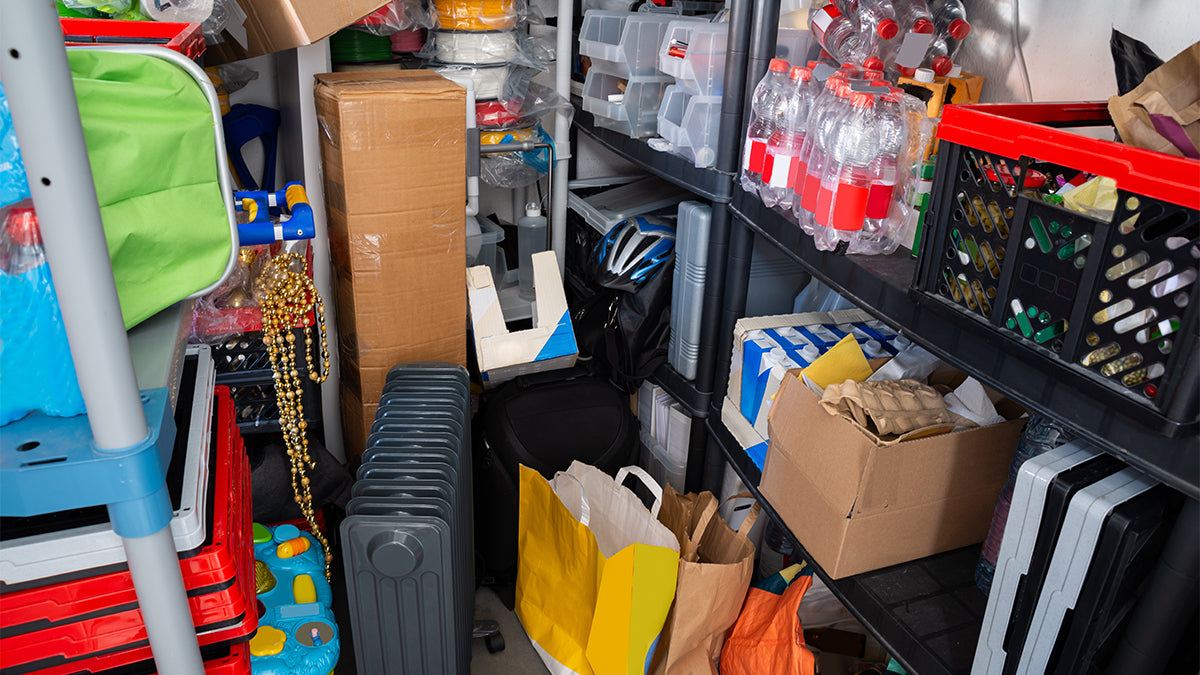In today's world, our homes tend to fill up with a lot of “stuff.” From kids’ toys to Tupperware to holiday decorations, it’s easy to accumulate too much. This leads us to a critical question: How do we prepare for the unknown without crossing into the realm of hoarding?
As a company dedicated to family emergency preparedness, Emergency Essentials understands the delicate balance between being prepared and going overboard. So how do you walk that fine line?

Understanding Preparedness
Let’s start with what it means to be prepared.
Preparedness is all about being ready for unexpected situations—think natural disasters, power outages, and even economic despair.
It’s about having enough supplies to keep life as normal as possible, as well as ensuring your family is safe and comfortable until the situation is hopefully fixed. This includes stocking things like food, water, first aid kits, and other essentials.
The key to being prepared is planning. Instead of buying all the boxed macaroni and toilet paper in the store, you have a well-thought-out stockpile that can sustain your family for a specific period of time. (Experts recommend at least 72 hours' worth of supplies, but encourage up to three months' worth.)
Related Read: Why Your Emergency Kit Might Be Missing the Most Important Thing: Comfort Food
The Hoarding Mentality
Hoarding, on the other hand, is the excessive accumulation of things, often to the point where it disrupts your daily life. It’s driven by fear rather than logic. In essence, it is the opposite of having a plan.
This often results in buying more than you need and can lead to wasted money, a lack of space, and just downright confusion.
Unlike preparedness, hoarding isn’t strategic or organized. It creates clutter and disorganization, making it difficult to find what you need in an emergency.
Signs of Hoarding:
- Buying in Excess: Purchasing more supplies than your family can realistically use before they expire.
- Compulsive Shopping: Feeling an urgent impulse to buy items you don’t need every time you hear news about potential disasters.
- Lack of Space: When your living space becomes compromised due to the number of stored supplies.

Creating Balance
How do we find the balance between too much and too little preparedness?
Educate Yourself
Understanding what is actually essential for your survival is key. There’s a big difference between stocking up and stocking away everything you see.
Formulate a Plan
Determine what your family realistically needs for a set period. If you are just starting on your preparedness journey, aim for that 72-hour mark. If you are looking farther ahead, three months is an ideal benchmark.
Having a timeframe in mind helps prevent overbuying and ensures you only stock what is necessary. Factor in each family member's basic food, water, and medical needs without going to extremes.
Adopt a First-In, First-Out System
Keep an eye on expiration dates. You want to make sure you are using older supplies first. Doing this will keep your stockpile fresh and help prevent the accumulation of unused, expired goods. Make it even easier with our long-lasting #10 cans!
Related Read: Here's How to Make Rotating Your Food Supply Quicker and Cheaper
Be Smart with Your Space
Allocate a specific area in your home—or several small areas if you don’t have one large space—for emergency supplies. By confining your stock to this space, you avoid the temptation to overfill other areas of your home, which can lead to hoarding.
Regular Inventory Checks
Schedule monthly or quarterly checks of your supplies. This important habit helps you keep track of what you have, what you need to use soon, and what supplies need replenishing. It’s an effective way to maintain balance and verify that you are prepared.

Avoid Impulse Buys
It's easy to be swayed by deals or panic purchasing, especially during a crisis. Remember your plan. Avoid buying items just because they are on sale—or because others are stocking up on them.
Educate Yourself on Shelf Life
Understanding how long items last can help prevent needless overbuying. For instance, knowing that dried beans have a longer shelf life than canned vegetables can guide your purchasing decisions.
Choose from our wide selection of #10 cans and food kits for extended shelf-life options.
Related Read: The Science of Shelf Life and How to Slow It Down
Focus on Versatility
Choose to stock up on items that can be used in multiple ways. For example, baking soda can be used for cleaning, cooking, and as a toiletry. Versatile items reduce the need for specialized products, thereby minimizing the chances of hoarding supplies.
Digitalize Your Preparedness Plan
Keep a digital record of your inventory, expiration dates, and needs. Digital tools can help you track your stock levels and remind you when it's time to use or replace items. You won't be left guessing!
Practice Mindful Shopping
Be aware of your purchasing habits. Ask yourself if an item is truly necessary for your emergency kit, or if you're buying it out of fear or because it's a trending item.
Share and Learn from Community
Engage with local preparedness groups or online forums. Sharing experiences and learning from others can provide insights into managing supplies effectively and avoiding hoarding behaviors.
Preparedness Takes Time
Remember: Preparedness is a marathon, not a sprint. It’s about building and maintaining an emergency supply over time, not rushing to the store at the last minute every time something happens.
By understanding the difference between preparing and hoarding, you can make sure that you’re ready for whatever comes your way without crossing the line into excess. Stay safe, stay prepared, and most importantly, stay mindful.


5 comments
Richard Briggs
This is great
Pat5 Babcock
Excellent advice in the article. New insight gained.
Patricia Kammerer
Excellent article, good for helping explain my thought process in Preparing to family members who are not yet on board. Stay Safe, All!
D. Alan
Excellent common sense and goal building system.
Bernita
Thank you for this article. I t was very helpful.